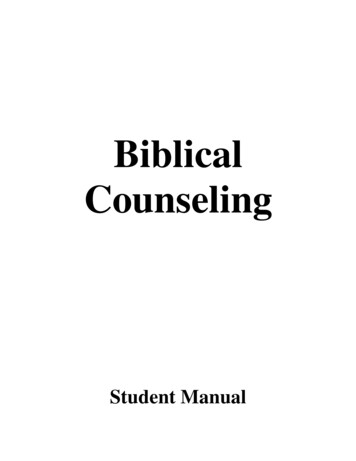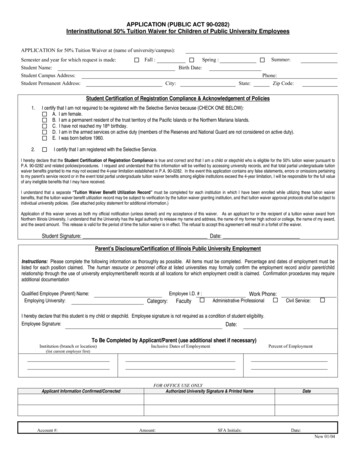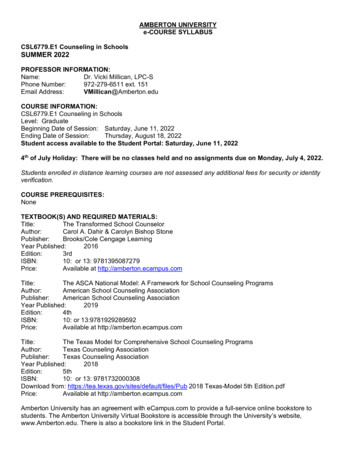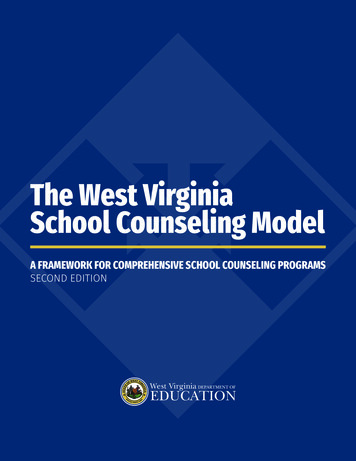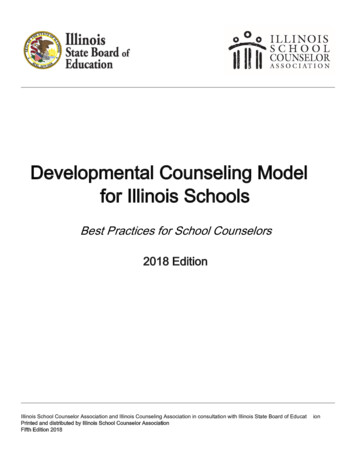
Transcription
Developmental Counseling Modelfor Illinois SchoolsBest Practices for School Counselors2018 EditionIllinois School Counselor Association and Illinois Counseling Association in consultation with Illinois State Board of EducatPrinted and distributed by Illinois School Counselor AssociationFifth Edition 2018ion
Developmental Counseling Model for Illinois Schools - 5 th Edition, 2018TABLE OF CONTENTSForewordExecutive SummaryRationale and ContextWhat is the Illinois Model?Who Should Use the Illinois Model?Key HighlightsWhat’s New in the 2018 Edition of the Illinois Model?Statement of Support from the Illinois Schoo l Counseling AssociationBrief History of the ModelRecognizing the First Illinois ModelRevisions to the Illinois ModelAcknowledgementsChapter 1: IntroductionIntroduction, Rationale, and PhilosophyPurpose of School CounselorsQualifications and Training of an Illinois School CounselorIllinois School Counseling Program Critical ElementsChapter 2: Structural FrameworksTransforming School CounselingThe Difference Between a “Guidance Counselor” and a “School Counselor”School Counseling DomainsWhat is MTSS and Why is it Important?MTMDSS: A New Way for School Counselors to Think About MTSSChapter 3: FoundationProfessional Standards and C ompetencies for School CounselorsStandards and Resources for Navigating Ethical & Legal ChallengesSchool Counseling Standards for StudentsBeliefs, Vision, Mission StatementNeeds AssessmentsProgram GoalsImpacts of Local, State, and Federal LegislationDiversity Statements and ToolsChapter 4: ManagementAgents of ChangeGarnering Administrative Support for the School Counseling ProgramPerformance Appraisal and Program AssessmentsUse of TimeCalendars1
Developmental Counseling Model for Illinois Schools - 5 th Edition, 2018Annual AgreementAdvisory CouncilUse of DataAction PlansLesson PlansManaging for GreatnessChapter 5: DeliveryDelivery System Incorporating the Three TiersDirect vs. Indirect Services: How the Tiers AlignSchool Counseling Core CurriculumIndividual Student PlanningResponsive ServicesReferralsConsultationCollaborationChapter 6: AccountabilityThe Accountability ProcessResults ReportsFlashlight PresentationsFull Hyperlink References by ChapterAlphabetized References2
Developmental Counseling Model for Illinois Schools - 5 th Edition, 2018ForewordIn Illinois, it is our mission to provide leadership and resources to achieve excellence across all Illinoisdistricts and to ensure equitable outcomes for all students. This work involves stakeholders, as togetherwe build, strengthen and sustain whole, h ealthy systems wherein every school offers a safe and healthylearning environment for all students. School counselors serve a critical role in ensuring student successthrough the supports they provide to youth both in and out of the classroom. School co unselors are criticalintermediaries for students in numerous ways, as we prepare all students for academic success, collegeand career readiness, and healthy social - emotional development.As school counselors in Illinois mirror national efforts of the A merican School Counselor Association, theirwork incorporates building adult competencies which impact student academic performance while alsoidentifying and responding to specific non - academic factors. The importance of addressing the complexneeds of d eveloping human beings is a best practice and now holds greater prominence in comprehensiveeducational opportunities such as in the Every Student Succeeds Act (ESSA). Illinois reflects that social andemotional development of children and youth is essenti al to academic success with a requirement since2013 for all programs leading to licensure in Illinois to demonstrate ways in which they inform and instructtheir candidates on the social and emotional standards ( refer to this page ). Illinois further prioritizes theimportance of meeting the needs of “the whole child” as an essential part of promoting academicexcellence which is reflected within the Illinois Sta te Board of Education’s Vision: “Illinois is a state ofwhole, healthy children nested in whole, healthy systems supporting communities wherein all citizens aresocially and economically secure.”As you work on behalf of the students of Illinois, it is my hope that you will find this document a valuableresource. Thank you for your commitment to promoting the very best opportunities and supports for ourstudents as they develop interpersonal competencies and the ability to function successfully andresponsibly in life.Tony Smith, Ph.D.State Superintendent of Education3
Developmental Counseling Model for Illinois Schools - 5 th Edition, 2018Executive SummaryRationale and ContextThe school community is confronted daily with challenges that directly interfere with the educationalprocess. These challenges require that schools abandon traditional methods in favor of new, proactive,innovative approaches that support the academic ach ievement of ALL students. School counselors areuniquely qualified and positioned to serve as critical intermediaries for Illinois students in numerous waysas they prepare all students for academic success, college and career readiness, and healthysocial/emotional development.Ultimately, the Illinois school counselor’s goal is to help ‘every student succeed’ and support them inbecoming productive classroom and school community contributors, competent and satisfied in theirfuture careers, and socially /emotionally healthy individuals throughout their lifespan. This can lead to along - lasting, statewide impact in our economy, culture, mortality, quality of life and well-being in everyregion of Illinois.What is the Illinois Model?The Developmental Co unseling Model for Illinois Schools, hereafter referred to as the “Illinois Model,” is atool used to assist school counselors and administrators in building a school counseling program that iscomprehensive in scope, preventive in design, developmental in nature, and focused on the threeAmerican School Counselor Association (ASCA) domains: academic, career and social/emotional. TheIllinois Model is strongly aligned to and builds on the fundamental, evidence - based components of theASCA National Model (2012) and tailors them for Illinois’ unique population and school communities. Itincludes best practices, samples, templates, and resources from across the nation.The approach described in the Illinois Model is proactive, emphasizing universal Tier 1 school counselingsupports for ALL students and the use of “data identifiers” to actively target students in need of Tier 2 and3 supports. It discusses how Illinois School counselors can work to assess areas of student growth throughaccountability syste ms embedded in district improvement plans which ensure continuous growth in ourstudents and our comprehensive school counseling programs.The Illinois Model was developed to support school counselors and administrators in utilizing the ASCANational Mod el, content specific to Illinois, and other nationwide best practices within Illinois schools,including MTSS, Illinois Social/Emotional Learning Standards, Common Core discipline - specific standards,school counseling services as outlined by the Illinois S chool Code (105 ILCS 5/10 -22.24b), IllinoisStandards for the School Counselor, and school counseling classroom curriculum.Who Should Use the Illinois Model?This manual is prepared primarily for school counselors, but is recommended for use by administ rators,teachers, school support personnel, parents, community members, and policy makers. Highly adaptable,the Illinois Model offers Illinois districts the freedom to collaboratively contribute their own expertise as it4
Developmental Counseling Model for Illinois Schools - 5 th Edition, 2018relates to the developmental needs of students.School counselors are ideally and uniquely equipped for the coordination and organization of their school’sschool counseling program. Yet, to effectively achieve the goals of the Illinois Model in its fullest sense, allkey stakeholders must play a signif icant role in its implementation, from school staff and communitymembers, to university educators who train school counselors, administrators, and teachers. The IllinoisModel can and should be used by anyone who desires to understand how school counselin g programs canbe successfully implemented in schools.Key HighlightsOrganized by ASCA National Model component (Foundation, Management, Delivery, and Accountability),the Illinois Model stresses that effective school counseling programs: Sup p ort the s chool’s mis s ion a nd d emons tra te a mea s ura b le impa ct on the school’s g oa ls. Ad voca te for the eq uity a nd a cces s of a ll s tud ents , ta king into cons idera tion the unique need s of itsow n d ivers e p opula tion. Provid e s chool couns eling sup p orts a round the three d oma ins (a ca d emic, s ocia l/emotiona l, ca reer)to ALL s tud ents b a s ed on tiered need (Tier 1 univers a l core curriculum for ALL s tud ents ; Tier2 d a ta - informed, ta rg eted s up p orts provid ed to SOME s tud ents; Tier 3 d eep a nd intens ives upp orts for FEW s tud ents). Colla b ora te w ith a d minis tra tors , s ta ff, s tud ents, p a rents , community memb ers, a nd other keys ta kehold ers . Ap prop ria tely us e s chool counselors’ time, skills, a nd energ y s o they ma y a d eq ua tely focus ona chieving the g oa ls of the s chool couns eling prog ra m throug h d irect a nd ind irect s ervices for a lls tud ents . Note: The Illinois Model recommends a maximum school counselor -to-student ratio of1:250 and that school counselors spend 80% or more of their time inservices to students.appropriate direct and indirectWhat’s New in the 2018 Edition of the Illinois Model?The new es t ed ition of the Illinois Mod el w a s d es ig ned to build on prior mod els w hile integ ra ting keyelements reflective of the evolving p rofes s ion of s chool couns eling a nd the cha nging need s of Illinoiss tud ents . Sp ecifica lly, the follow ing ha nds - on tools a nd fea tures ha ve b een a dd ed: Illinois Learning Standard Crosswalk : This res ource is d es ig ned to s upp orts chool couns elors in more effectively colla b ora ting w ith tea chers to d elivers chool couns eling core curriculum in the cla s sroom. Us ing the Illinois Lea rningSta nd a rd s’ g ra d e ba nds (K-3 , 4 -5 , 6 -8 , 9- 10 , 1 1- 1 2), it outlines s ta nd a rds forea ch content a rea tha t ca n b e ta ug ht or co- ta ught in the cla s sroom b y s choolcouns elors . This ena bles school couns elors to ea s ily loca te Illinois Lea rningSta nd a rd s rela ted to s chool couns eling, build thos e s ta nd a rd s into s choolcouns eling less on p la ns, a nd demons tra te to a dminis tra tors a nd tea chersw hich s ta nda rd s their cla s sroom les s ons w ill s up p ort. School Counseling Core Curriculum Resource List : The d evelop ment of a LIVE a nd ever- expa ndingres ource lis t of sa mp le core curricula ha s been a d d ed to b etter ena b le school couns elors to loca tecurriculum for us e in the cla s s room.5
Developmental Counseling Model for Illinois Schools - 5 th Edition, 2018 Ad d itiona l Tier 1 res ources for s chool couns elors, includ ing a Sample School C ounselingCurriculum Map , horizontally and vertically aligned across all grade levels K - 12 and sample lessonplan packages (lesson plan, all needed materials, pre/post - test) for select topics. Alignment to the newest ASCA National Model Position Statements(2017), ASCA EthicalStandards for School Counselors (2016), ASCA Mindsets & Behaviors for Student Success (2014),and cutting - edge school counseling terminology, best practices, and systems including the newMulti -Tiered, Multi - Domain System of Supports for School Counselors (Hatch, 2017). An expanded discussion of the difference between a traditional “guidance counselor” and atransformed “school counselor.” Qualifications and training of an Illinois school counselor. Listing of critical school counselin g program elements recommended to be implemented in allIllinois schools.Statement of Support from the Illinois School Counseling AssociationThe Illinois School Counseling Association (ISCA), a division of the Illinois Counseling Association, fullysupports the implementation of the Illinois Model in all schools across the state. It strives to promotelegislation that supports the ideal ratio o f school counselors to students (1:250), educate key stakeholderson the appropriate roles and responsibilities of the school counselor, and advance the profession to thebenefit of all students across the state. Additional goals from the bylaws include: SECTION 2. The mission of the Illinois School Counselor Association is to provide leadership,advocacy, and collaboration for Illinois school counselors, which results in systemic change toenhance the success of all students in their academic, college, car eer, and social/emotionaldevelopment. SECTION 3. The primary goal of the Illinois School Counselor Association is to encourage, enhance,and promote the work of the school counselor as a vital link in the educational experience ofstudents. The major foc us is to assist pre - kindergarten through post - secondary students inmaximizing their academic college, career and social/emotional growth and development.(ISCA, 2017, Bylaws)In addition, ISCA seeks to link current, relevant training opportunities for pra cticing Illinois schoolcounselors through annual conferences, workshops, and virtual training opportunities. Through theseefforts, the field of school counseling is moving in a progressive direction in the state of Illinois.6
Developmental Counseling Model for Illinois Schools - 5 th Edition, 2018Brief History of th e ModelThe planning and implementation of developmental counseling is not entirely new to the work of schoolcounselors. From the outset, school counselors provided individual and group counseling for studentsalong with individual planning for academic and career development. In the 1960’s and 1970’s, counselorswere educated to offer large group guidance activities. Some schools were offering extensive groupguidance activities. For example, Niles North High School in Skokie, Illinois offered a comprehe nsive groupguidance program that was highly developmental in scope. Curriculum projects were written in thesummers of 1965 and 1966, and counselors delivered the activities in 25 - minute homerooms which metevery school day. Utilizing this format, counsel ors could see all students – freshmen, sophomores, juniorsand seniors - any day of the week. Programming covered academic, career and social/emotional topics forGrades 9 through 12.As school counselors advanced to guide more students in areas outside o f career, educationalorganizations also worked to define the role of school counselors. In 1983 the Illinois State Board ofEducation (ISBE) published “Pupil Personnel Services Recommended Practices and Procedures Manual:School Counseling .” The goal was to outline the basic role and function of the school counselor. In thispublication, the role and function of the school counselor was described as the “Constellation of Services”model, and this description was in common use from the 1960’s through the early 1980’s. Critics of thismodel pointed out that counselors played an important but ancillary role in the total education of thestudent. Furthermore, this model was too oriented to ward high school counseling and did not speak tohow elementary and middle school counselors should function. Critics began talking of a different form ofrole and function for the school counselor, which is known today as “school counseling.”Recognizing the First Illinois ModelIn the early 1990’s, in response to the national movement to create comprehensive, developmental schoolcounseling programs, the Illinois Counselor Educators and Supervisors (ICES), in collaboration with theIllinois School Counselor Association (ISCA) and the Illinois Counseling Association (ICA), saw a need andtook the initiative to develop a model specifically for Illinois school counseling programs. These threeentities must be recognized for their leadership, dire ction, encouragement, and financial support of the firstIllinois Model; indeed, without their combined resources, the model would not have been possible.When the first team of writers began this undertaking, the task force agreed that there was no needto“recreate the wheel” in writing the Illinois Model. The writers concluded that there was an abundance ofgood information already available to school counselors and that the task should be to combine the bestof what was available into the Illinois docu ment.The writers found that they not only borrowed from many sources, but some areas took on a uniquenessall their own, making this truly an Illinois Model. The references section reflects the variety of resourcesthat were used. The first Illinois Mod el drew heavily upon the work of Dr. Norman C. Gysbers, University ofMissouri - Columbia; his contributions to this model and to developmental school counseling are significant.7
Developmental Counseling Model for Illinois Schools - 5 th Edition, 2018The first writers of the model were also guided by state programs from Alaska,Connecticut, Indiana, Iowa,New Jersey and Wisconsin. After several years of hard work, “The Developmental Counseling Model forIllinois Schools” was published in 1996.Revisions to the Illinois ModelSince the first Illinois Model was published in 1996, the world has gone through many changes that havehad a direct impact upon the work of school counselors. Updating the Illinois Model is responsive to thechanging needs of school counseling in the state of Illinois. Consider these recent powerful influen cesshaping our youth and consequently, our profession: Sta te a nd fed era l leg is la tion, es p ecia lly the Every Stud ent Succeed s Act (ESSA), formerlya uthorized a s the “No Child Left Behind Act,” ha s ha d a grea t effect up on the a ca d emic d oma in.The increa s ed empha sis on s tud ent s up p orts hig hlig hts the role of s chool couns elors . Technolog ica l exp los ion a nd g loba liza tion of the internet ha ve a d d ed new mea ning to ca reer a ndp os ts econd a ry p la nning. Thes e influences a nd burg eoning Illinois colleg e a nd ca reer rea d ines ss ta nda rd s p unctua te the critica l role of s chool couns elors w ho a re tra ined in thes e imp orta nt a rea sof a ca d emics a nd ca reer p la nning . Another educa tiona l initia tive develop ing a cros s the s ta te is the"comp letion of a concrete p os ts econd a ry p la n for s tud ents" a s a ma nda tory requirement forg ra d ua tion. The s ocia l/emotiona l d oma in ha s s een p erha p s the g rea tes t impa ct of a ll w ith violence, d isa s ters,a nd tra ged ies s uch a s La s Veg a s , Sa nd y Hook, New tow n, Northern Illinois Univers ity, Virg inia Tech,Hurrica ne Ka trina , 9 /1 1 , a nd Columb ine, touching the lives a nd hea rts of thos e a cros s the na tion,es p ecia lly our s tud ents.In 2 00 1, recog nizing the cha ng ing role a nd function of s chool couns elors , the Illinois Sta te Boa rd ofEd uca tion Student Services Provid ers Ad vis ory Boa rd w a s cha rg ed to revis e the 1 98 3 RecommendedPractices and Procedures d ocument. Und er the d irection of Eric Tha tcher, then School Couns elingCons ulta nt for ISBE, a nd w ith the w ork of ISCA rep res enta tives Doug Bush, Ca thy Shelton a nd Dr. AnnaMa rie Ya tes, a nd editoria l input from Dr. Toni Tollerud , the “ School Couns eling Bes t Pra ctices Ma nua l” w a screa ted . This d ocument reflected the comprehens ive a nd d evelop menta l p hilos op hy for s chool couns elors .Als o, school couns elors a nd couns elor ed uca tors b eca me memb ers of the Illinois Children’s Menta l Hea lthPa rtners hip . This g roup ’s w ork, throug h leg is la tion, ha s ha d a p os itive impa ct up on our child ren a nd thecouns eling profes s ion.The 20 10 vers ion of the Illinois Mod el w a s mea nt to p rovid e s chool counselors w ith pra ctices a ndp roced ures tha t w ould a s s is t them in b etter s erving a ll s tud ents. By utilizing the res ources from theAmerica n School Couns elor As s ocia tion a nd the Illinois Lea rning Sta nda rd s , the 20 10 mod el w a s intend edto b e a guid e for s chool couns elors moving tow a rd utilizing the ASCA Na tiona l Mod el, 2 nd Ed ition (2 00 5).The 20 14 vers ion of the Illinois Mod el w a s d es igned b e us ed a s a s up p lement to the new ly relea s ed 3 rded ition of the ASCA Na tiona l Mod el (2 01 2). An executive s umma ry w a s a dd ed, la ng ua g e w a s mod ified toreflect new ASCA terminolog y, a nd res ources w ere up da ted a nd s trea mlined a ccord ing ly. Checklis ts w erea ls o provid ed a t the b eg inning of ea ch cha p ter to help s chool couns elors review their und ers ta nd ing ofis s ues p res ented w ithin the cha p ter a nd ta ke pra ctica l s tep s tow a rds imp lementing their ow ncomp rehens ive, d evelop menta l, “tra ns formed ” school couns eling p rogra m.The 20 18 Revis ion Ta sk Force invites you to rea d this d ocument w ith fres h eyes, a n excited sp irit, a nd a8
Developmental Counseling Model for Illinois Schools - 5 th Edition, 2018can-do attitude to learn how to contribute to this innovative, cutting- edge approach to school counseling.This evidence-based model has proven results in student success and preparing them to b ecome the nextgeneration of parents, workers, leaders, and citizens. Our vision is that all Illinois administrators, teachers,students, families, community members, and policy makers will understand that school counselors are vitalmembers of the educati onal leadership team and critically important to student success. Together, we willmake a difference!Acknowledgements2017 - 2018 Revision Task ForceCore Revisions:Whitney Triplett, M.A., L.P.C., N.C.C., School Counseling Specialist, Chicago Public Schools (TaskForce Chair)Sarah Patterson - Mills, Ph.D., L.P.C. (MO), Counselor Educator, Lindenwood University- BellevilleAnna Marie Yates, Ph.D., N.C.C., L.P.C., Counselor Educator, National Louis UniversityCarla Stewart, Ed.D., N.C.C., L.C.P.C., Counselor Educator, National Louis UniversityAndrea Allen, M.A., L.P.C., Chicago Public Schools Master CounselorMartha Williams, M.A., Chicago Public Schools Master CounselorHeidi A. Truax, M.A., L.P.C., Chicago Public Schools Master CounselorTracy Cunningham, M.A., Chicago Public Schools Master CounselorLisa Stanton, M.S. Ed., N.C.C., School Counselor, Carterville Unit #5 SchoolsCynthia McCullough, M.A., School Counselor, Phillips High SchoolLindsay Muzzy, M.A., L.C.P.C., Chicago Public Schools Master CounselorReaders:Trish Hatch, Ph.D., San Diego State University, President/CEO, Hatching Results, LLCJanice Jackson, Ed.D., Chief Executive Officer, Chicago Public SchoolsKathleen Styzek, M.A., M.Ed., School Counselor, Volta Elementary SchoolKatherine Atkins, Ph.D., L.P.C., N.C.C., A.C.S., Governors State UniversityMelissa Ockerman, Ph.D., DePaul UniversityLee Harsy, M.S., Lewis UniversityBarbara Karpouzian, M.A., M.Ed., MIN, Past President, Illinois School Counselor AssociationSpecial Thanks:Vince Walsh - Rock, L.C.P.C., President, Illinois School Counselor Association (2017-2018)Franciene Sabens, M.S. Ed., L.P.C., N.C.C., School Counselor, Carbondale Community High SchoolNancy Sandoval, School Counseling Graduate Student, Loyola University ChicagoGabriela Rulka, M.A., School Counselor, Solorio AcademyAnjail Newell, M.A., L.P.C., N.C.C., School Counselor, Bond Elementary SchoolKelly Chaney, M.A., School Counselor, Ashe Elementary SchoolChantal Sweet, M.A., School Counselor, Hernandez Middle SchoolOlivia Haas, M.A., School Counselor, Tarkington Elementary SchoolWhitney Hastings, M.A., School Counselor, Courtenay Elementary SchoolDan Stasi, M.S., Executive Director, Illinois School Counselor Association9
Developmental Counseling Model for Illinois Schools - 5 th Edition, 20182012 - 13 Revision Task ForceIn 2012, ASCA released a fourth edition of the ASCA National Model. Therefore, a team of ISCA membersset forth to update and streamline the 2010 model. Members of this 2012 revision team are as follows:Core Revisions:Melissa Ockerman, Ph.D., Counselor Educator, DePaul University (Task Force Chair)Amelia Catania, School Counseling Graduate Student, DePaul UniversityChina Hill, School Counseling Graduate Student, National Louis UniversityIvy Malisow, School Counseling Graduate Student, DePaul UniversityFranciene Sabens, M.S. Ed., L.P.C., N.C.C., School Counselor, Chester High SchoolTiffany Stallone, M.A. School Counselor, Niles North High SchoolReaders:Erin Vandermore, M.A., L.C.P.C., School Counselor, Chicago Public SchoolsChristina Nolan, Ed.D., Counselor Educator, National Louis UniversitySpecial Thanks:Anna Marie Yates, Ph.D., N.C.C., L.P.C., Counselor Educator, National LouisErin Mason, Ph.D., Counselor Educator, ISCA President, 2012Mary Carideo, M.Ed., College Counselor, ACE Technical Charter High SchoolDan Stasi, M.S., Executive Director, Illinois School Counselor Association2010 Revision Task ForceA leadership council with representatives from the Illinois Counseling Association (ICA), Illinois CounselorEducators and Supervisors (ICES) and the Illinois School Counselor Association (ISCA) aske d for a revisionof the 2009 Illinois Model. The president of each respective association invited readers and writers to jointhis revision team, including the following:Core Revisions:Brett Zyromski, Ph.D., Northern Kentucky University (Task Force Chai r)Venisa Beasley -Greene, Ed.D., School Counselor, Chicago Public SchoolsAmber Bolden, M.Ed., School Counselor, Evanston High School, Adjunct Faculty at Loyola UniversityErin Mason, Ph.D., Counselor Educator, DePaul UniversityDale Septeowski, Ed.D., Arg osy UniversityAnna Marie Yates, Ph.D., N.C.C., L.P.C., Counselor Educator, National LouisReaders:Holly J. Nikels, Ph.D., Western Illinois UniversityChuck Pistorio, Ph.D., Northeastern Illinois UniversityToni Tollerud, Ph.D., Northern Illinois Univer sitySpecial Thanks:Martha Casazza, Ed.D., Dean of the College of Arts and SciencesStephen Thompson, Ph.D., Associate Dean of the College of Arts and SciencesChristopher Clemmer, D.Min., Chair of the Counseling and Human Services DepartmentDavid Bakrins , Graduate Student, National Louis UniversityAnna Klimkowicz, Graduate Student, National Louis UniversityNancy Davis, Graduate Student, National Louis University10
Developmental Counseling Model for Illinois Schools - 5 th Edition, 2018Amy Konopasek, Graduate Student, National Louis UniversityAmanda Douglas, Graduate Student, National Louis UniversityMelissa Romero, Graduate Student, National Louis UniversityMichael Drayer, Graduate Student, National Louis UniversitySheryl Sierakowski, Graduate Student, National Louis UniversityNoreen Garmisch, Graduate Student, National Louis UniversityNancy Steinberg, Graduate Student, National Louis UniversityNichole Giovanni, Graduate Student, National Louis UniversityJoseph Tranchita, Graduate Student, National Louis UniversityJoely Johnson,, Graduate Student, National Louis UniversityAllison Wasowski, Graduate Student, National Louis UniversityJane Haskins Wolfe, Graduate Student, Argosy University2005 Revision Task ForceIn 2005, a committee was formed and work commenced to revise the 1 996 Illinois Model. Team memberswere serving on the leadership councils of the Illinois Counselor Educators and Supervisors (ICES) and theIllinois School Counselor Association (ISCA). The 1996 writers were also invited to participate in therevision proc ess. Many individuals contributed time and expertise to this endeavor. The team members forthe Second Edition included the following:Anna Marie Yates, Ph.D., N.C.C., L.P.C., Counselor Educator, National- Louis University (Task ForceChair)Maria McCabe, M.A., L.C.P.C., Retired Elementary School CounselorAl Milliren, Ed.D., N.C.C., B.C.P.C.,Counselor Educator, Governors State UniversityMary Milliren, Retired Elementary School CounselorRoseanne Oppmann, M.S., Middle School Counselor, District 205 RockfordGreg Stolzer, M.A., High School Counselor, District 99 Downers GroveDale Septeowski, Ed.D., Counselor Educator, Argosy UniversityRick Shaw, Ed.D., Counselor Educator, National -Louis UniversityIllinois Model 1996Recognition for the 1996 Illinois Model is extended to the following people. The contributions of thesepeople are what took the Illinois Model from the idea to reality. It was a significant amount of work andtheir efforts and contributions deserve special notice.Writing Team:Editorial Team:Dr. Robert J. NejedloDr. Dale J. SepteowskiDr. Toni TollerudDr. Robert J. NejedloDr. Dale J. SepteowskiDr. Toni R. TollerudDr. Anna Marie YatesMaria McCabeOwen McCorkleLarry WilliamsAlso, Carla Luczak and Chris Kimball deserve a special thank you.11
Developmental Counseling Model for Illinois Schools - 5 th Edition, 2018Chapter 1: IntroductionBy the end of this chapter, readers will:Attitudes Believe in a s suming lea d ers hip roles in school communities a sw ell a s w ith s ta kehold ers to ma ximize school couns elingefforts .Developmental Counseling Modelfor Illinois Schools Introduction, Ra tiona le, a ndPhilos op hy Purp os e of School Couns elors Qua lifica tions a nd Tra ining ofa n Illinois School Couns elor Illinois School Couns elingProg ra m Critica l ElementsKnowledge Und ers ta nd the tools a va ila b le to enha nce und ers ta nd ing ofs chool couns eling in the school community a nd w ith keys ta kehold ers .Skills Id entify 3 -5 w a ys throug h da ta , pres enta tions , or othermea ns to a d va nce the tra nsformed school couns elor rolesa nd resp ons ib ilities in the s chool community a nd w ith keys ta kehold ers .Making the Mode
The Illinois School Counseling Association (ISCA), a division of the Illinois Counseling Association, fully supports the implementation of the Illinois Model in all schools across the state. It strives to promote legislation that supports the ideal ratio o f school counselors to students (1:250), educate key stakeholders

